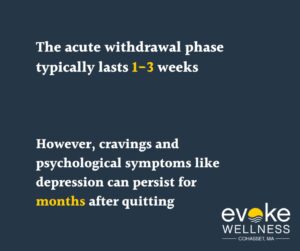As you look to overcome your cocaine addiction, you’re likely filled with a mix of hope and fear. The path ahead will be difficult, but with the right support, you can find the strength to break free of this dependence. Excessive cocaine usage can lead to withdrawal, including common symptoms like depression, fatigue, and drug cravings. However, exploring professional treatment options, from medical detox to long-term rehab programs, can help free you from addiction. Although the road to recovery will challenge you, take comfort knowing many before you have found the help they needed to regain their health and happiness. With determination and the aid of caring treatment specialists, you too can overcome this struggle. For more information call us at (617) 917-3485 today or reach out online and take the first step toward recovery.
Cocaine Withdrawal Symptoms
Crash and Craving
After the initial euphoria wears off, users often experience an intense “crash” into depression, fatigue, and anxiety. Intense cocaine cravings can also set in during this stage.
Physical Symptoms
Common physical withdrawal symptoms include muscle aches, nausea, tremors, and chills. Some experience intense drug cravings and an inability to feel pleasure from natural rewards.
Psychological Distress
Psychological distress like anhedonia (inability to feel pleasure), depression, anxiety, agitation, and suicidal thoughts are frequent during cocaine withdrawal. Sleep disturbances and increased appetite are also common.
Timeline
The crash phase typically lasts 1-3 days after last use. Acute withdrawal symptoms usually persist for 1-3 weeks but can last months. Depression and cravings may continue for years in some cases.
Early Cocaine Withdrawal Symptoms
Intense Cravings
In the first few days after stopping cocaine use, intense cravings and urges to use again are common. These can be both psychological and physical desires that require immense willpower to overcome.
Fatigue and Exhaustion
Cocaine provides an artificial boost of energy. Without it, the body and mind feel drained, leading to excessive sleepiness, lethargy, and fatigue during early withdrawal.
Agitation and Anxiety
Cocaine impacts dopamine levels, creating a pleasurable “high.” When the drug wears off, users may experience anxiety, restlessness, irritability, and mood swings as the brain re-adjusts neurotransmitter imbalances.
Depression
As dopamine levels plummet, some users sink into feelings of sadness, hopelessness, emptiness, and depression during the initial withdrawal phase. Suicidal thoughts can occur, requiring close monitoring.
Severity of Your Cocaine Withdrawal
The severity of cocaine withdrawal symptoms can vary significantly from person to person. It largely depends on factors like:
Frequency and Dosage
- Heavy, long-term cocaine use results in more intense withdrawal effects.
- Those using smaller doses or less frequently may experience milder symptoms.
Method of Use
- Smoking or injecting cocaine tends to produce more severe withdrawal than snorting.
- The faster the drug enters the bloodstream, the harsher the comedown.
Individual Physiology
- Genetics, metabolism, and overall health impact withdrawal intensity.
- Co-occurring mental health issues can worsen psychological distress.
While uncomfortable, cocaine withdrawal is rarely life-threatening when managed properly. Still, the distressing nature of symptoms makes professional treatment highly advisable. With medical support, the worst effects typically subside within a week or two.
Dangers of Cocaine Withdrawal
When attempting to quit cocaine, the withdrawal process can be extremely dangerous and even life-threatening without proper medical supervision. The acute detox program is crucial for managing these risks safely.
Seizures and Convulsions
One of the most severe dangers of cocaine withdrawal is the risk of seizures and convulsions. As cocaine levels drop, the brain struggles to regain chemical balance – potentially triggering violent muscle contractions and disrupted brain activity.
Dehydration and Electrolyte Imbalance
Heavy sweating, vomiting, and diarrhea are common during cocaine detox. This can rapidly lead to dangerous dehydration and electrolyte imbalances that require urgent IV fluid treatment.
Suicidal Thoughts and Depression
The drastic mood swings of withdrawal often involve intense depression and suicidal thoughts. Around-the-clock monitoring is necessary to ensure the individual’s safety during this volatile period.
Increased Heart Rate and Blood Pressure
Cocaine withdrawal causes a surge in blood pressure and heart rate, raising the risk of heart attack or stroke – especially in those with underlying cardiovascular issues. Medications may be needed to stabilize these vital signs.
The dangers of unsupervised cocaine withdrawal underscore the importance of seeking professional help through a comprehensive rehab program. With proper medical care, the worst risks can be mitigated as the body adjusts to sobriety.
Duration of Cocaine Withdrawal
The Acute Withdrawal Phase
The initial, intense withdrawal symptoms from cocaine typically last 1-3 weeks. This acute phase involves intense cravings, fatigue, depression, anxiety and other psychological effects.
The Protracted Phase
Even after acute withdrawal, many users experience protracted withdrawal symptoms that can last for months. Common protracted effects include mood swings, irritability, sleep disturbances and cravings.
Individual Differences
The exact duration varies based on the individual’s physiology, severity of addiction, environmental triggers and other factors. Regular, heavy users may experience more prolonged withdrawal compared to casual users. Professional treatment is recommended for a full recovery.
Treatment for Cocaine Withdrawal and Addiction
Detox and Withdrawal Management
To begin the recovery process, you must first go through detoxification to rid your body of cocaine. Withdrawal can cause intense cravings, depression, fatigue, anxiety and other uncomfortable symptoms. Medical detox programs provide a safe, supervised environment to manage these effects. Medications may be used to ease withdrawal and cravings.
Behavioral Therapy
After detox, behavioral therapies are crucial for overcoming addiction’s psychological aspects. Cognitive-behavioral therapy helps identify and change drug-use triggers. Contingency management uses incentives to reinforce positive behaviors. Family therapy improves relationship dynamics impacted by addiction.
Inpatient or Outpatient Rehab
Intensive inpatient treatment or residential treatment immerses you in a substance-free environment with 24/7 support. Outpatient programs allow you to live at home while attending counseling and therapy sessions. The ideal program depends on your needs and circumstances. Many start inpatient then transition to outpatient care.
Ongoing Recovery Support
Recovery is an ongoing process. Peer support groups, sober living homes, group therapy programs, and alumni programs all provide community and accountability after rehab. Developing relapse prevention strategies and coping skills is critical for sustained sobriety.
Cocaine Withdrawal FAQs
How long does cocaine withdrawal last?
The acute withdrawal phase typically lasts 1-3 weeks. However, cravings and psychological symptoms like depression can persist for months after quitting. The duration largely depends on the severity of the addiction.
What are common cocaine withdrawal symptoms?
Common physical symptoms include fatigue, sleep disturbances, increased appetite, and muscle aches/pains. Psychological symptoms may include depression, anxiety, irritability, anhedonia (inability to feel pleasure), and intense cravings.
Is cocaine withdrawal life-threatening?
While very uncomfortable, cocaine withdrawal itself is not usually life-threatening for most individuals. However, severe depression and suicidal thoughts are potential risks that require medical monitoring.
Do medications help treat withdrawal?
There are no FDA-approved medications for cocaine withdrawal specifically. However, certain medications can help alleviate specific withdrawal symptoms like depression, anxiety, or muscle aches. Proper medical detox is highly recommended.
Conclusion
While the acute symptoms tend to resolve within a few weeks, psychological cravings can persist for months. Withdrawal is merely the first step; maintaining sobriety over the long-term remains challenging. Entering a professional treatment program greatly improves your chances of overcoming addiction for good. Whether inpatient or outpatient, these programs provide the comprehensive care and support essential to your recovery. Surround yourself with positive people committed to your well-being. Take it one day at a time, focusing on progress not perfection. With patience and perseverance, you can reclaim your health and happiness. A cocaine-free life is within reach if you stay strong and keep moving forward.
Begin Your Journey with Evoke Wellness at Cohasset
If you or a loved one is considering treatment, Evoke Wellness at Cohasset invites you to contact us. Our compassionate team is ready to answer your questions, discuss your needs, and help you take the first steps toward recovery. In Cohasset, you’ll find more than just a treatment program – you’ll discover a community dedicated to your wellness and success. Together, let’s embrace the journey to recovery and the promise of a new beginning. Call us at (617) 917-3485 today or reach out online.





